Teisė ISSN 1392-1274 eISSN 2424-6050
2023, vol. 126, pp. 166–181 DOI: https://doi.org/10.15388/Teise.2023.126.12
Mediation in the Activities of a Lawyer
Raimonda Kraemer LL.M.
Legal doctorate from Mykolas Romeris University
Address: Ateities g. 20, Vilnius 08303, Lithuania
Workplace: Law firm Lukas
Im Sionstal 3-5, 50678 Cologne
Phone No.: 0221 28275740, Fax: 0221 28275741
Friedrichstr. 7, 40217 Duesseldorf.
Phone No.: 0211 15937650, Fax: 0211 15937651
Email: raimondakraemer@hotmail.de
The article presents the results of the research and reveals the following: do lawyers use mediation in their activities, how often do they do it; how do lawyers evaluate their activities in mediation, what are the reasons for this. Is the lawyers’ knowledge of mediation sufficient, what influence does the mediator’s qualification have on this; how lawyers value mediation, what is their attitude towards this method of ADR; whether and how well lawyers are able to provide clients with information about mediation and what is the opinion of lawyers regarding the most suitable profession for the role of mediator.
Keywords: mediation, lawyer, client, parties to the dispute, recommend, do not recommend, amicable settlement of the dispute.
Mediacijos taikymas advokato veikloje
Straipsnyje pristatomi mediacijos taikymo advokato veikloje tyrimo rezultatai ir atskleidžiama: ar advokatai taiko mediaciją savo veikloje, kaip dažnai; kaip advokatai vertina savo veiklą mediacijoje, kokios to priežastys. Ar advokatams pakanka žinių apie mediaciją, kokią tam įtaką turi mediatoriaus kvalifikacija; kaip advokatai vertina mediaciją, koks jų požiūris į šį AGS būdą; ar ir kiek advokatai geba suteikti klientams informacijos apie mediaciją ir kokia yra jų nuomonė apie tinkamiausią profesiją mediatoriaus vaidmeniui.
Pagrindiniai žodžiai: mediacija, advokatas, klientas, ginčo šalys, taikus ginčo sprendimas.
_________
Received: 04/12/2022. Accepted: 01/03/2023
Copyright © 2023 Raimonda Kraemer. Published by Vilnius University Press
This is an Open Access article distributed under the terms of the Creative Commons Attribution License, which permits unrestricted use, distribution, and reproduction in any medium, provided the original author and source are credited.
Introduction
The dispute resolution system, which has been developing for centuries, constantly requires changes, and the activities of lawyers are no exception. A study conducted by the European Network of Councils for the Judiciary (Alternative Dispute Resolution..., 2017) shows that due to the high workload of the courts, the length of court proceedings increases, and, at the same time, litigation costs also increase. The lack of confidentiality, the desire of the parties to have more control over the persons who will resolve their dispute, encourages the disputing parties to use faster, more economical, simpler and more understandable methods of dispute resolution, such as mediation (Alternative Dispute Resolution..., 2017). The discipline of mediation was created and developed based on various interdisciplinary sources, such as conflict and behavior research, communication and psychological sciences (Rüstow, 2008).
Legal acts issued by the European Council and European Union institutions promote the development of mediation and do not limit the application of mediation in the activities of lawyers. Back in 2007, on March 3, CEPEJ (The European Commission for the Efficiency of Justice) formed the mediation working group CEPEJ-GT-MED, which prepared the recommendations of the Council of Europe to assess the impact of mediation (Analysis on assessment...). Later, on December 27, 2007, based on them, the CEPEJ presented guidelines for the better implementation of the existing recommendations related to family mediation and mediation in civil relations (Guidelines for a better implementation...). The guidelines provide specific measures to effectively facilitate the implementation of the recommendations of the Committee of Ministers of the Council of Europe No. R (98) 1, R (99) 19, Rec (2001) 9 and R (2002) 10 and to improve the implementation of the mediation principles provided for in them. The guidelines discussed the role of not only judges, but also lawyers, appealing to the awareness of lawyers and noting that codes of conduct for lawyers should, in appropriate cases, include an obligation or recommendation to consider ADR methods, including mediation, before going to court (paragraph 48). The guidelines also encourage bar associations and legal associations to keep lists of mediation service providers and provide them to lawyers (paragraph 53). In addition, the guidelines pay a lot of attention to the mediator’s qualifications and training (paragraphs 20–25).
Comparing the legal provisions in force in Lithuania, intended for mediation in the activities of lawyers, with those in other countries, it is noticeable that the legal regulation in Lithuania is more structured, detailed and comprehensive. In Germany, Austria and Great Britain, legal norms that are more abstract and leave more freedom for interpretation. It can be assumed that some foreign countries can afford less detailed and comprehensive regulation of mediation today, because the traditions of applying mediation in them are already established.
Not only has the expression of mediation and legal regulation changed over time, but also the nature and scope of lawyers’ activities in resolving disputes: from the traditional activities of a lawyer to additional specialization and/or activities through alternative dispute resolution. In Business Law, lawyer has become increasingly perceived as a person with expanded expertise (Konnertz, 2014).
The object of the study is the attitude of Lithuanian, British, German and Austrian lawyers to mediation.
Nature and methods of the work. To carry out the research, the following methods were used: scientific literature analysis, document analysis, i.e. analysis of results of legal regulation assessment and comparison, synthesis, survey and quantitative research.
The topic of the research is analyzed based on scientific literature, current Lithuanian, British, German and Austrian normative legal acts, Mediation Directive and other legal acts adopted by EU institutions, as well as on CCBE and CEPEJ joint project “Lawyer’s Mediation Guide” (Mediation Development Toolkit...).
Study population – lawyers from Germany, Great Britain, Austria and Lithuania, included in the lists of lawyers and selected in a probabilistic way, regardless of their education, gender, age and length of service. In planning this study and given that a representative sample is obtained when the characteristics of the sample correspond with high accuracy to the characteristics of the population, it was important to identify a sample that would allow statistically significant conclusions to be drawn (Stichprobenrechner...; Apklausos imties dydis...; Sample Size Calculator...). Therefore, the selection of respondents was done in a probabilistic way, and the sample volume was calculated on the basis of special sample volume calculators, taking into account that in social research 95% reliability (Kardelis, 2002) is usually chosen and that an error of 5-10% is acceptable in such studies (Ruževičius, 2016).
In order to form a representative sample of lawyers, the data provided by the German, British, Austrian and Lithuanian bar associations on the total number of lawyers was taken into account, on the basis of which the population size of this study was determined – all in all 314,698 lawyers. According to sources of information from bar associations in 2020, at the beginning of the year, there were 166,375 lawyers in Germany (Statistics of German lawyers...), 6,569 in Austria (Statistics of Austrian lawyers...), 2,130 in Lithuania (Vėgėlė, 2020) and 139,624 in Great Britain (Statistics of Great Britain lawyers...).
As the general population consisted of 314,698 lawyers, the choice of sample error admissible for this study was 6 percent, the sample size of the study was set at 267 respondents. 292 lawyers answered the survey questions. In order to increase the representativeness of the sample, the aim was to interview as many respondents as possible. Therefore, 6622 lawyers were invited to participate in the survey. The majority of respondents to the survey were lawyers practicing in Germany (70.89%, N = 207). The participation of lawyers from other countries in the survey is lower, i.e., from Lithuania (10.62%, N = 31), Austria (9.59%, N = 28) and Great Britain (8.90%, N = 26).
The aim and objectives of the research. After conducting a survey of lawyers in Lithuania, Great Britain, Germany and Austria (the survey was conducted from February 14, 2020 to May 31, 2020) regarding the application of mediation in their activities and on the basis of the data obtained during it, to reveal the following: whether lawyers apply mediation in their activities, how often they do it; how do lawyers evaluate their activities in mediation, what are the reasons for this. To disclose whether the lawyers’ knowledge of mediation is sufficient, what influence the mediator’s qualification has on it; how lawyers value mediation, what is their attitude towards this method of ADR; whether and how well lawyers are able to provide clients with information about mediation and what is the opinion of lawyers regarding the most suitable profession for the role of mediator.
Research overview. In Lithuania, there is quite a lot of scientific literature on the topic of mediation, but very few scientific works that would examine the application of mediation in the activities of lawyers practicing in Lithuania. There are two scientific papers that have touched on the issue of mediation in the work of a lawyer: G. Štaraitė-Barsulienė dissertation Possibilities of application of mediation in notarial activities and directions of improvement of legal regulation in Lithuania prepared in 2010–2017, in which the peculiarities of notarial, lawyer and judge activities as possible mediators were analyzed (Štaraitė-Barsulienė, 2018), and N. Kaminskienė, A. Tvaronavičienė, G. Čiuladienė and I. Žalėnienė scientific article Investigation of Lithuanian Lawyers’ Attitudes Towards Peaceful Dispute Resolution and Mediation published in 2016, which revealed the reasons for not applying mediation in the activities of a lawyer (Kaminskienė et al., 2016). Fragmentary insights into the activities of a lawyer in mediation can also be found in the methodological publication Mediator’s Guide (Kaminskienė et al., 2019) published in 2019 and in the public presentations of the proponent of mediation, researcher R. Simaitis and lawyer G. Černiauskas (Simaitis, 2020). The selected research object in Lithuania has not been comprehensively analyzed at all. Thus, it is safe to say that the doctrine of Lithuanian Law is really lacking scientific works prepared by analyzing and researching the activities of lawyers in mediation.
Assessing global research on mediation, it has been observed that mediation methods and strategies have been the subject of research in America since 1970. In Europe, mediation has been somewhat forgotten for the last 100 years (Hehn, Alsdorf, 2008). However, although the activities of a lawyer in mediation abroad are studied in more detail than in Lithuania, the author considers that there is a lack of consistent research covering the full application of mediation in the activities of lawyers.
Relevance of the topic. Lawyers’ positive attitude towards mediation and dissemination of knowledge about mediation in society are one of the main criteria that can encourage disputes to be resolved in mediation. Lawyers are often the first point of contact when a dispute situation arises. Therefore, it is important that they are not only able to properly inform their clients about peaceful dispute resolution options, but also, if necessary, can properly provide such services themselves.
Use of mediation in the professional activities of lawyers. The study showed that although more than 90% of lawyers use mediation in their activities, 25% use mediation only sometimes and only 3% – often. This means that although lawyers use mediation in their activities, they do it too rarely. This is especially noticeable among Lithuanian and German lawyers.
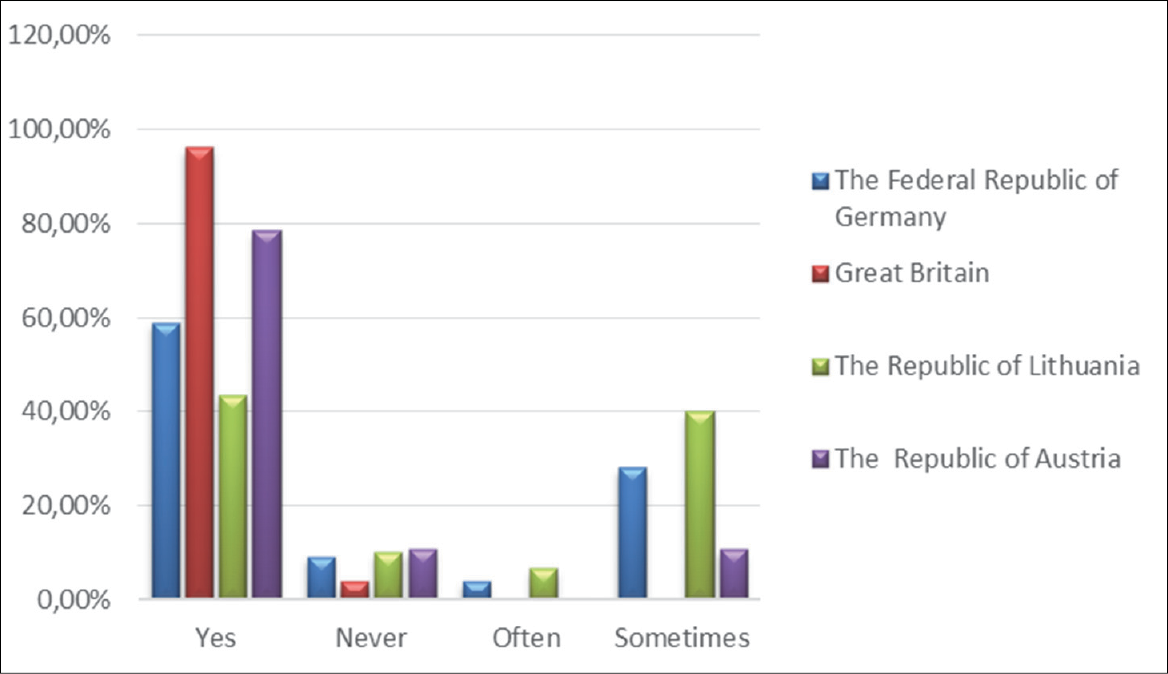
Fig. Application of mediation in the professional activities of lawyers in four countries (percent)
With a high level of dispute escalation, the parties to a dispute often no longer believe that an agreement with the other party is possible. In such cases, the parties to the dispute often no longer want to try to resolve the dispute amicably, no longer want a direct communication between them and demand a judicial settlement of the dispute. The lawyer then finds himself/herself between his/her desire to settle the dispute through mediation and the client’s claim to take the dispute to court.
Lawyers usually want to do what they do best, i.e., to provide legal advice and represent clients in court (Hehn, Alsdorf, 2008, p. 375), but today they often face a dilemma – to stay with the traditional activities of a lawyer and/or to take up additional activities, i.e., apply mediation. In order for a lawyer to make the right decision, he/she first needs to understand effective methods of dispute resolution, because today, more than ever before, lawyers operate in a highly competitive market (Hellwig, 2009). Therefore, lawyers need to understand that the added value of their activity is inseparable from the ability to effectively resolve disputes in various ways (Hellwig, 2009). Lawyers who are overly litigious risk becoming socially irrelevant in the cost-controlled business world, as increasingly demanding clients are reluctant to settle for standard dispute resolution (Cominelli, 2016).
Mediation experts also agree that the involvement of lawyers in mediation is a necessary condition for the development of mediation. For example, researcher R. Simaitis claims that if lawyers are left out of mediation, the development of mediation becomes complicated. Researcher A. Trossen noted that lawyers can support mediation. Only in cases where non-legal topics are mediated (e.g., improving relationships, work atmosphere, etc.) lawyers do not play a major role. Researcher H. Dexler states that for further dissemination in society, it would be important for lawyers and mediation to complement each other and not be seen as alternatives. Seeking to satisfy the client’s interests to the maximum, the lawyer must know the peculiarities of both the judicial process and mediation, the similarities and differences, advantages and disadvantages, and mutual interaction between these two institutes.
The author considers it appropriate not to reduce the significance of involving lawyers in mediation, because both from the answers of mediation experts, and from the answers of the lawyers themselves, and all the other material of the research conducted by the author, it is obvious that the involvement of lawyers in mediation is indeed an extremely important condition for the development of mediation.
Regarding the reasons for which mediation is or is not applied in the activities of lawyers, the study showed that the application of mediation in the activities of lawyers is mostly encouraged by better satisfaction of clients’ expectations in mediation and less negative emotions and psychological tension experienced in mediation. The main reasons why lawyers do not use mediation in their activities are the lack of clients who would like to resolve the dispute in mediation, and the lawyers’ thinking that, even without mediation, the parties to the dispute can be successfully reconciled.
Assessment of lawyers’ activities in mediation. Most of the respondents (54.70%, N = 157) answered that they value mediation in their activities ‘well’, while only 26.13% (N = 75) – ‘very well’. The rest varied between ‘satisfactory’ (14.29%, N = 41) and ‘unsatisfactory’ (4.88%, N = 14). These numbers show that lawyers still have room for improvement, as only a quarter of the respondents rate their work in mediation as ‘very good’.
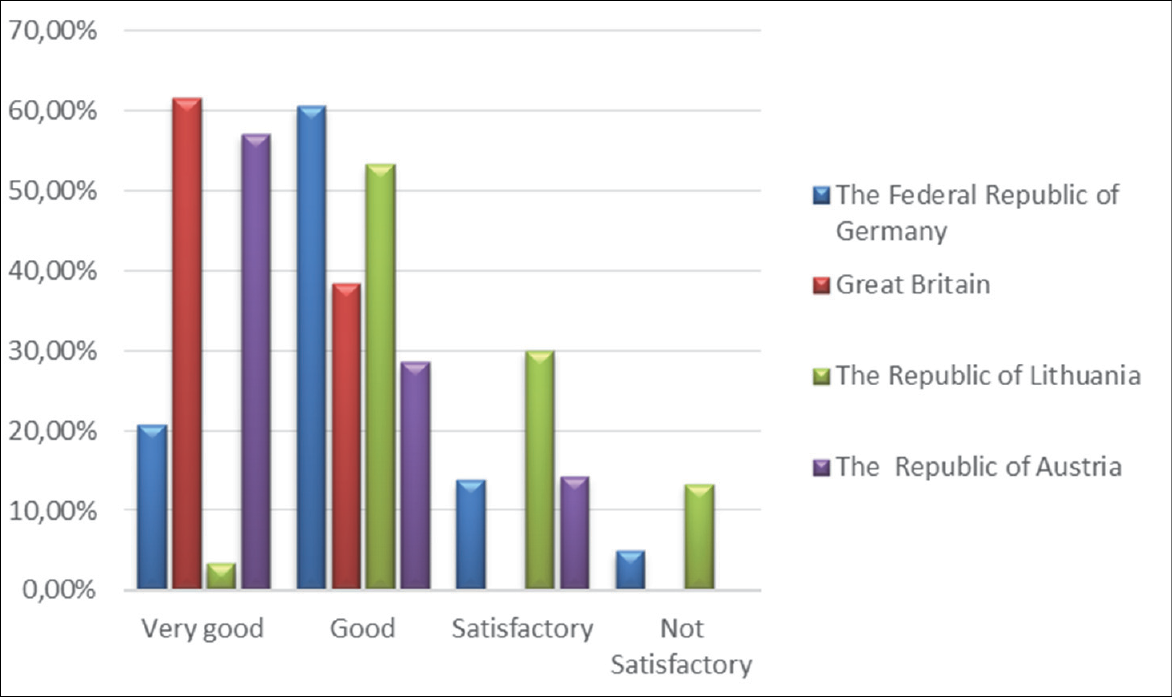
Fig. Evaluation of lawyers’ activities in mediation in four countries (percent)
Although mediation is not a service exclusively provided by lawyers (German RDG...), it is nevertheless inevitably related to dispute resolution. Mediation in the activity of a lawyer differs from the provision of legal advice, since the law can only be discussed in the mediation process as the main reference point for a possible dispute resolution. Lawyers applying mediation are not legal decision-makers, although they have legal training (Trenczek et al., 2017, p. 441).
The study showed that in most cases lawyers assess mediation positively and can apply it in various areas of legal relations. Nevertheless, the interest of lawyers in mediation is still very low, and the application of mediation in the activities of lawyers, especially in Lithuania, is rare. On the other hand, it can be seen that the number of Lithuanian lawyers participating in mediation in the role of mediator has increased over the last five years.
The study also showed that less than a quarter of lawyers believe that every case they have encountered in their practice is suitable for mediation. Meanwhile, almost half of the respondents indicated that every second, every third or every fourth case is suitable for mediation. The expressions of these answers signal a favorable attitude of lawyers towards resolving disputes by means of mediation, as only a relatively small number of lawyers (3.48%) indicated that they have not encountered cases suitable for mediation.
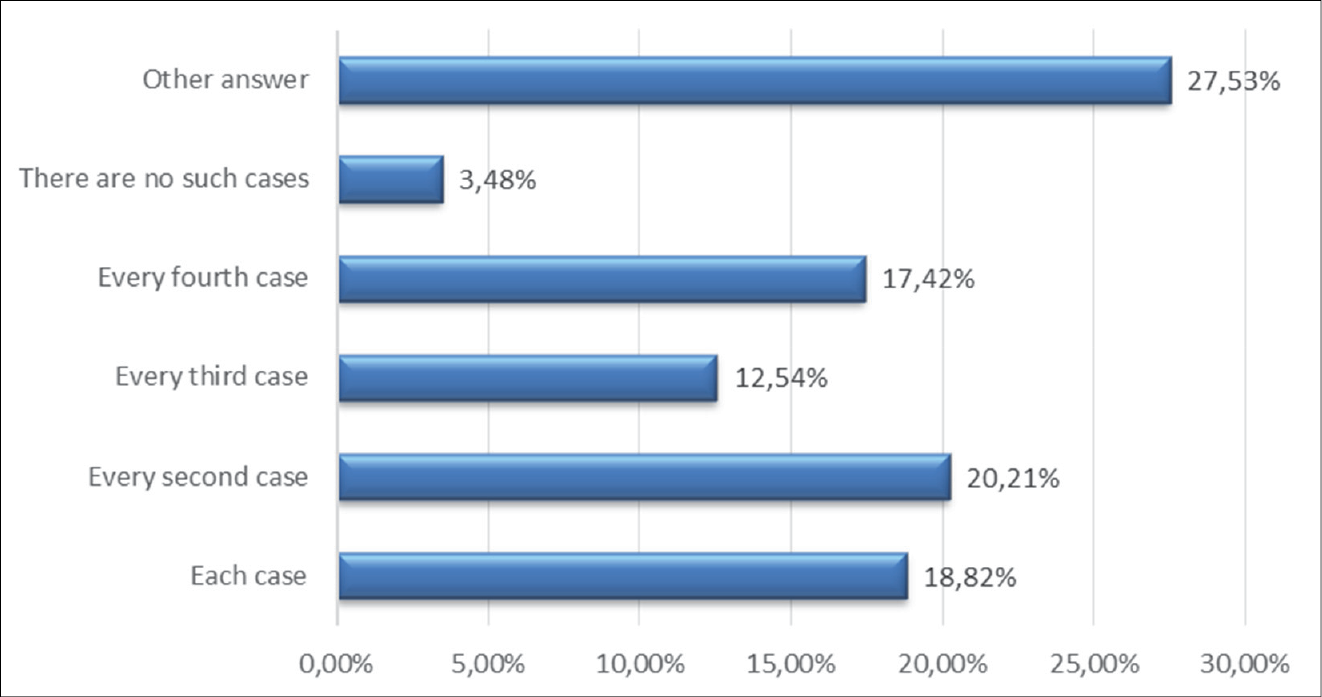
Fig. Eligibility for mediation of disputes faced by lawyers in their activities (percent)
It is noteworthy that, regardless of the role played by the lawyers in the mediation, the mediation usually ended with a settlement of a peaceful agreement. From this, it can be concluded that mediation is valuable not only for the parties to the dispute, but also for the lawyers, because their clients’ loyalty to the lawyers who helped to resolve the dispute in a way acceptable to the client grows. In addition, it promotes the confidence of the lawyers themselves in mediation, because they see that mediation works and the next time they are more confident in offering it to their clients and dare to start mediation themselves.
Mediation is a great way to effectively resolve a dispute, but there is no guarantee that the dispute will actually be resolved. Due to the informal and non-public process, mediation causes less stress, and the success of the mediation procedure reduces negative emotions and psychological tension (Kaminskienė et al., 2019, p. 25–26). The study also revealed that the largest part of lawyers (37.47%) use mediation in their activities due to better satisfaction of clients’ expectations, and one fifth (20.08%) because they experience less negative emotions and psychological tension. In addition, mediation can be cheaper, faster, less risky compared to court proceedings (Valente, 2014). However, the decision in mediation is left for the responsibility of the parties to the dispute, so the risk that the parties to the dispute will not be able to reach amicable agreement remains (Breidenbach, 1997). It is believed that it is appropriate to entrust the resolution of disputes to professional lawyers, because then the legality and enforceability of the accepted amicable agreement conditions are better ensured (Kaminskienė et al., 2019, p. 53).
Despite this, many lawyers are skeptical regarding mediation because they fear losing their jobs due to competition. Another part of lawyers is not afraid of a decrease in the need for legal services (due to the growing number of dispute resolution in mediation), but is afraid of competition from mediators who are not lawyers. According to M. Henssler (Henssler, 1997, p. 134), lawyers should not have doubts about the competition between them and mediators who do not have legal qualifications, because there will always be opportunities to cooperate with psychologically or pedagogically trained specialists. As for the competition of lawyer-mediators with mediators of other professions, one cannot fail to notice that mediators with legal qualifications are often considered more competent (Wambach-Schulz, 2018, p. 17). Therefore, the opportunities for lawyers to establish themselves in the free market of mediation services are greater (Wambach-Schulz, 2018, p. 17).
Lawyers’ knowledge of mediation. The majority of the lawyers surveyed rated their knowledge of mediation as ‘very good’ (41.92%) or ‘good’ (41.24%) and only a small proportion rated as ‘satisfactory’ (15.12%) or ‘low’ (1.03%). The lowest proportion of respondents (0.69%, N = 2) indicated that they had no knowledge of mediation.
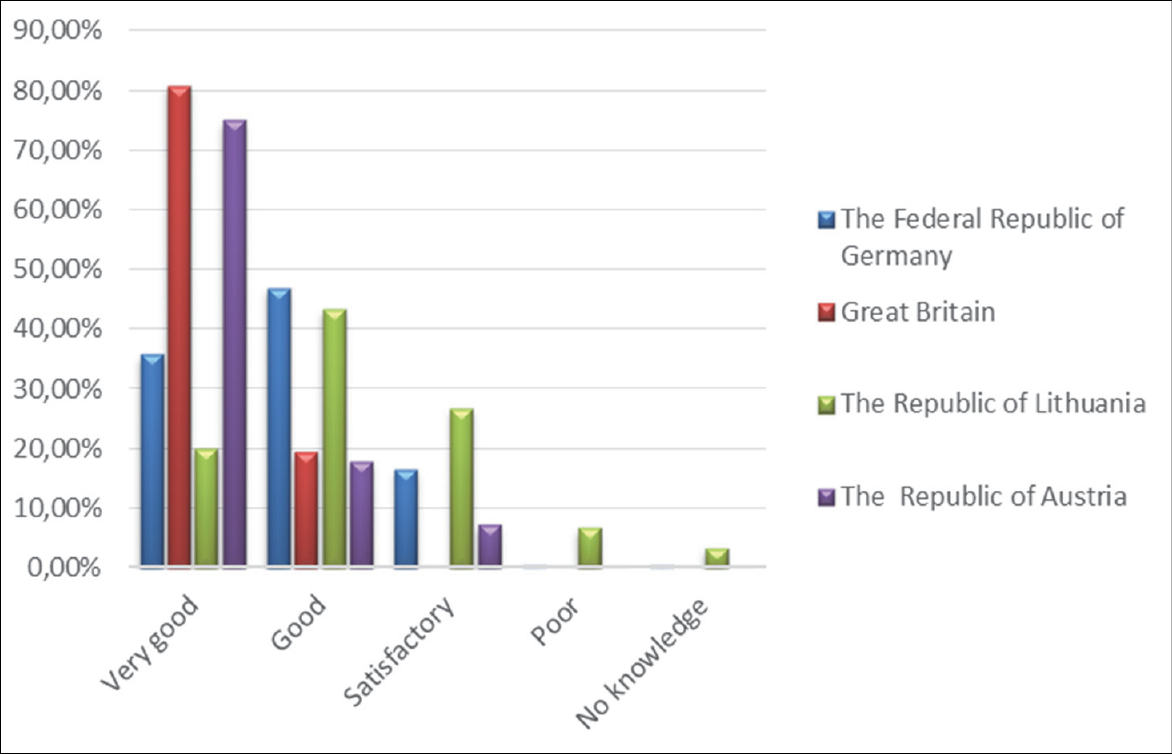
Fig. Respondents’ knowledge of mediation in four countries (percent)
Country-by-country analysis shows that British and Austrian lawyers ranked the best in the field of mediation. In contrast, only just over one third of lawyers in Germany and only one fifth of lawyers in Lithuania appreciated their knowledge of mediation as ‘very good’, suggesting that there is a predominance among respondents of ‘very good’ or ‘good’ knowledge of mediation.
This study shows that lawyers qualified as mediators have better appreciation of their knowledge of mediation. For example, ‘very good’ and ‘good’ appreciation of the knowledge of mediation was as high as 100% of British respondents. The same number of respondents were qualified as mediators in Great Britain. Among the respondents to the survey, the smallest number of qualified mediators was in Lithuania. Lithuanian lawyers also scored the least on their self-assessment of the expertise in the field of mediation.
The majority of all respondents had obtained the qualification of a mediator (67.87%, N = 188). Evaluating the situation between different countries, it is noticeable that the least number of lawyers who had obtained the qualification of mediator were in Lithuania - 42.86% (N = 12). On the contrary, all respondents from Great Britain had acquired the qualification of a mediator (100%, N = 24). Meanwhile, there were 89.29% from Austria (N = 25), and 64.47% from Germany (N = 127). The fact that more lawyers with mediator qualifications took part in the survey than those without can be explained by the fact that the survey may have appeared more relevant to those lawyers with mediator qualifications. Obtaining the mediator’s qualification shows the lawyers’ interest in mediation.
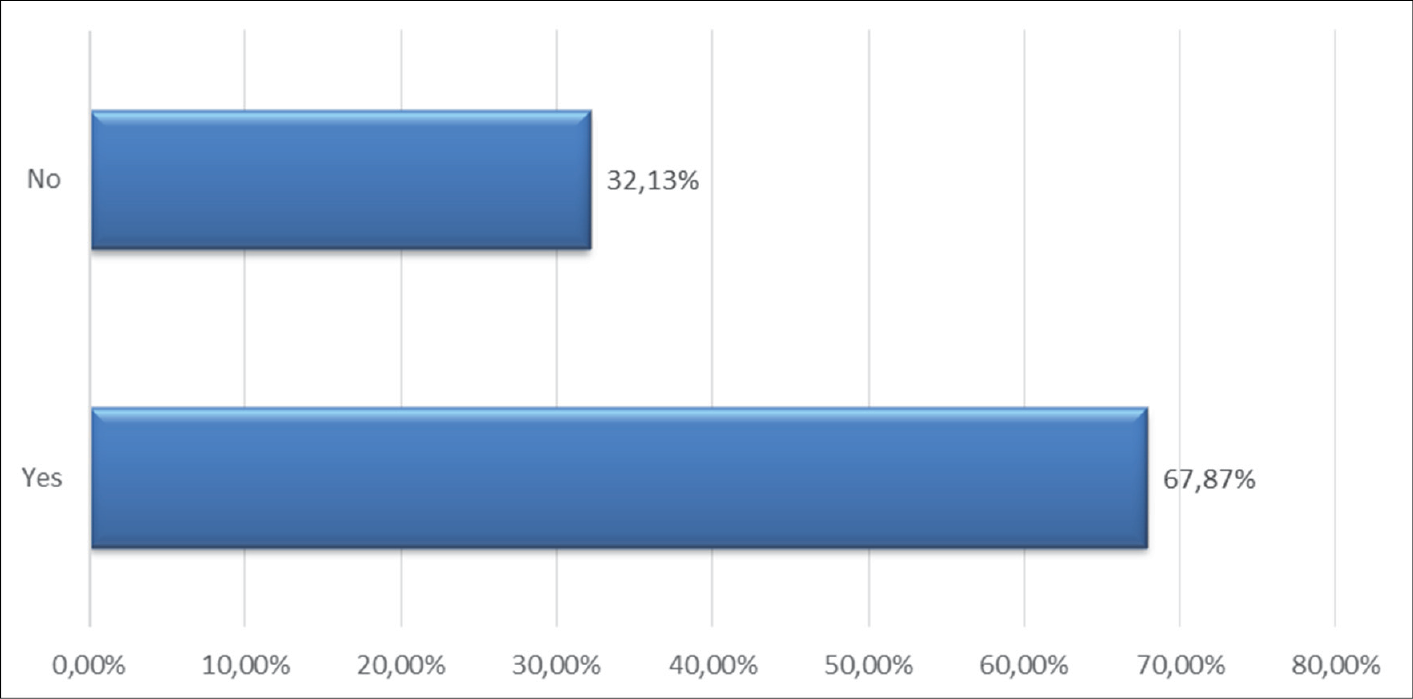
Fig. Distribution of respondents having the qualification of a mediator (percent)
The study also showed that lawyers believe they are best suited for the role of a mediator compared to other professions. Lawyer’s profession is actually one of the most suitable for the role of mediator, without denying that other professions, such as, for example, a judge, a psychologist or a teacher, are also suitable for this. Legal thinking can, in one case, actually hinder mediation, but in another, it can be a key aspect in breaking an impasse.
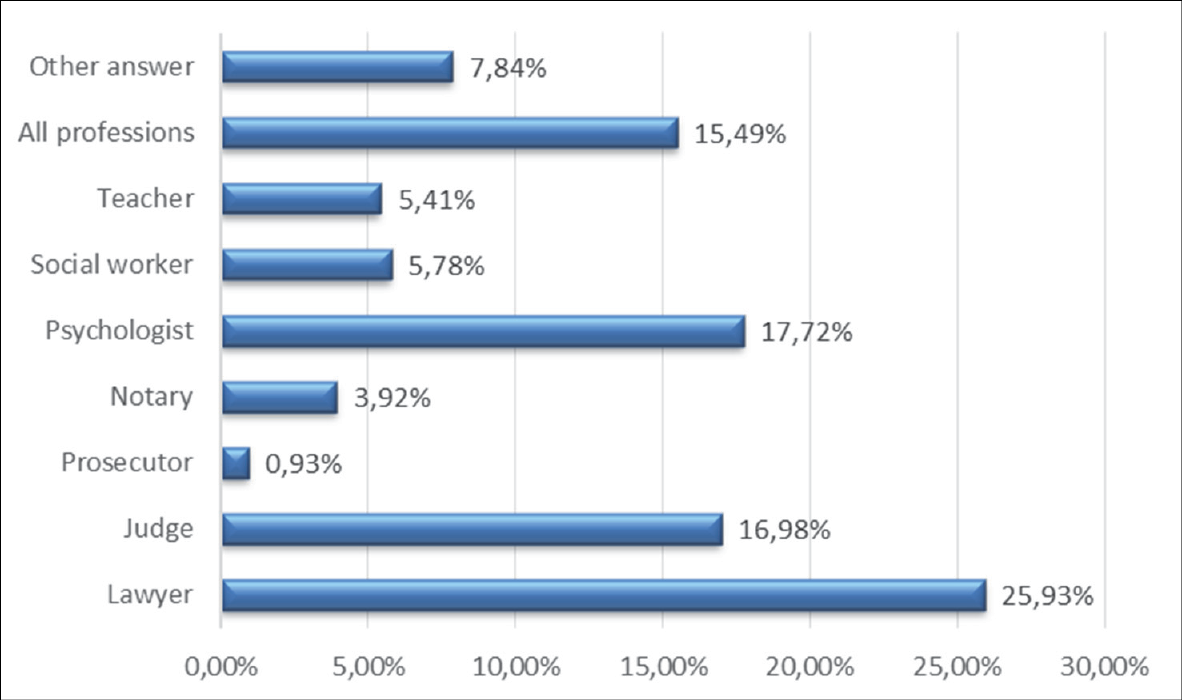
Fig. Profession most suitable for the role of a mediator (percent)
Another aspect that can be seen in the assessment of those results relates to the attitude of lawyers regarding the use of mediation. For example, in the question of why the respondent does not use mediation in his/her own activities, Austrian respondents were the most likely to flag a lack of qualifications in mediation (18.03%). In Great Britain, no lawyer has taken note of that reply. In view of the fact that Austrian lawyers assess their knowledge in mediation either ‘good’ (75%) or ‘very good’ (17.86%), it can be concluded that they consider only very good knowledge in the field of mediation as sufficient qualifications in mediation. In Great Britain, none of the respondents reported that their qualifications in the field of mediation were insufficient, but only 80.77% of respondents rated their knowledge in this field ‘very good’, while the rest rated as ‘good’. It should be assumed that, unlike Austrian lawyers, British lawyers have lower qualifications in the field of mediation, which, in their view, is sufficient to provide mediation service.
In the opinion of researcher N. Kaminskienė and other authors, the education of lawyers on the issue of mediation has a fundamental influence on the formation of a positive evaluation of the mediation process both in the lawyer community and in society in general (Kaminskienė et al., 2019, p. 49). Lawyers usually end up in mediation only when the court recommends mediation and convinces the parties that they could try the mediation process, because lawyers have too little information and knowledge about what mediation is and what mediation options are to solve the dispute without going to court, and this is a big problem, because the benefits of mediation are obvious (Černiauskas, 2020).
It is noticeable that when analyzing the requirements for the qualification of a lawyer mediator and comparing the practices of different countries in this matter, different requirements are found. Article 4 of the EU Mediation Directive (Directive 2008/52/EC of the European Parliament...) gives the member states a wide scope of action, it is important to ensure effective mediation services and quality control procedures for these services. The European code of conduct for mediators stipulates that in order to ensure the competence of mediators, it is important to promote proper training and constant updating of knowledge and practical skills (Code of conduct for European mediators..., p. 243). A factor that strengthens the success of mediation is the extremely high qualification of the lawyer in the field of mediation.
The greater the conflict between the disputing parties and the more complex the legal relations that have led to the dispute, the more necessary is the high qualification of a lawyer providing mediation services. The author’s research revealed that only a very small percentage of lawyers (5.63%) believe that the requirements for mediator qualifications in their country are ‘very high’ and more than a third of lawyers (37.32%) think that they are ‘high’. More than half of the requirements for the qualification of lawyers were rated as ‘average’, ‘low’ or ‘other’. This shows that the requirements for mediator qualifications could be ‘higher’ in all four countries. In addition, the expressions of the survey responses signal a favorable attitude of lawyers to longer and specialized training for lawyers who play the roles of not only mediator, but also representative or neutral advisor in mediation. Evaluating the research conducted by the author, it can be seen that the fewest lawyers who had obtained the mediator qualification were in Lithuania – 42.86 %, in Germany – 64.47 %, and in Austria – 89.29 %. Meanwhile, all respondents from Great Britain had obtained the qualification of mediator.
To summarize, it can be stated that the greater the conflict between the disputing parties and the more complex the legal relations that have led to the dispute, the higher qualification of a lawyer providing mediation services is required. Therefore, the extremely high qualification of a lawyer in the field of mediation can be a factor that strengthens the success of mediation, when the parties to the dispute will be professionally directed to solve the dispute constructively.
Lawyers’ ability to explain to clients what mediation is. A large proportion of lawyers in all assessed countries reported being able to provide clients with information about mediation either on ‘very good’ (48.97%) or ‘good’ (41.38%) level, while only a small proportion of respondents rated this ability as ‘satisfactory’ (7.93%) or ‘low’ (0.69%). Only a very small proportion of respondents (1.03%) stated that they did not have this ability. These figures show that most lawyers are ‘good’ and even ‘very good’ in explaining to clients what mediation is.
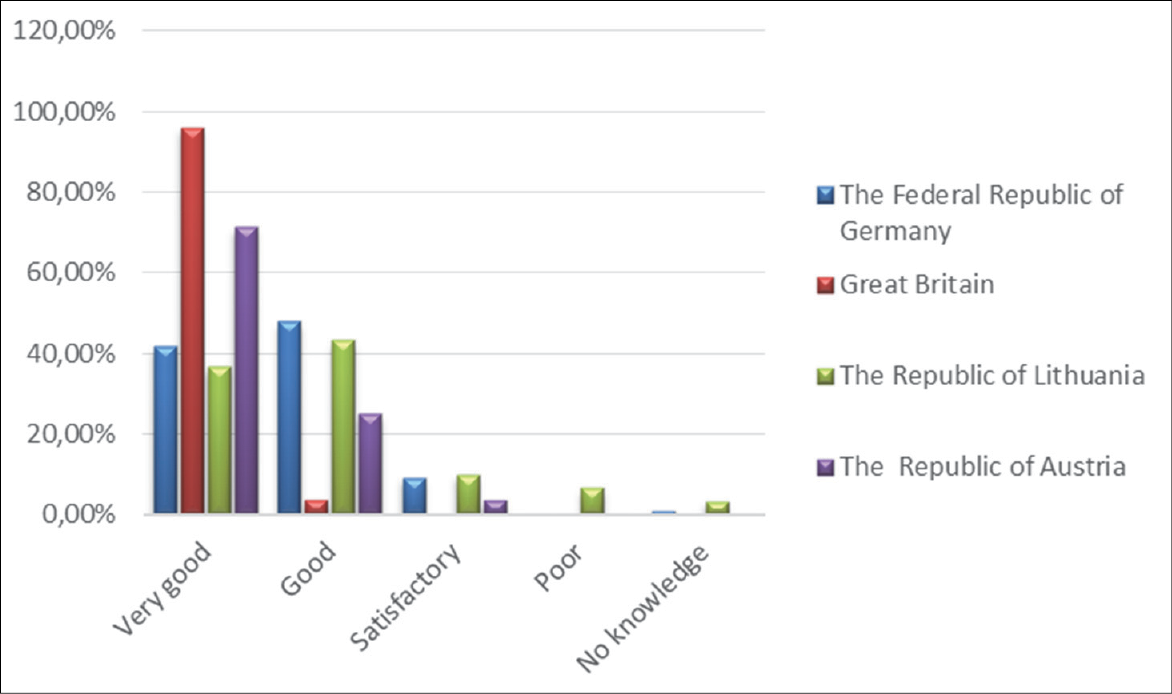
Fig. Respondents’ ability to explain mediation to clients in four countries (percent)
It is interesting to note that, when analysing the replies of lawyers from individual countries, British lawyers ranked best in their ability to explain to clients what mediation is, and Lithuanian lawyers rated themselves as worst.
The survey findings that less than half of the respondents (48.97%) rated their ability to explain to clients what mediation is ‘very good’, and almost a quarter of respondents (23.97%) indicated that they did not use mediation because there are no clients who would like to settle a dispute in mediation, suggests presumption that the small number of clients willing to resolve a dispute in mediation may be partly promoted by the lawyers themselves. That conclusion is based on the fact that some clients may not receive full information on mediation from their lawyers, some of whom are not able to explain sufficiently to their clients what mediation is.
The next challenge concerns the lawyer’s ability to explain to the client that the dispute does not necessarily have to be settled in court, that the dispute can be resolved by the parties themselves, peacefully with the help of a neutral, independent and impartial person – a mediator. When advising a client on which dispute resolution procedure to choose, the lawyer should do so in such a way that the client is able to make a responsible, most favorable and acceptable decision. However, the author notes that in cases when clients do not have even the slightest knowledge of mediation, a lawyer may find himself at a dead end and be unable to convey the benefits of mediation.
Another challenge faced by lawyers, which the author tends to attribute to the essentials, is the issue of the separation of the activities of a lawyer and a mediator. In theory, it seems that there should be no major problems – the lawyer must be neutral, independent and impartial when carrying out mediation. Legal advice should not be shared between the parties to the dispute by a lawyer unless he or she provides general advice at the request of the parties. In practice, unfortunately, it is not as easy and simple as it may seem at first glance. Legal nuances in dispute resolution are often inseparable from factual nuances. It is difficult for lawyers to refrain from legal advices as they know them well, especially if one or both parties to the dispute seek the opinion of the lawyer conducting the mediation on one or another issue. It is also very difficult to ‘feel’ the limit at which a lawyer with legal knowledge must take active steps to ensure that the weaker side of the dispute is not disadvantaged.
Although lawyers are the entities that are the first and directly face the conflict situations of the disputing parties, time costs limit the ability of lawyers to inform clients in detail about all dispute resolution options during the first meetings. The more so is because in practice we often encounter situations where the information provided is illegible or misunderstood. As the disputing parties lack basic knowledge and information about mediation, it is obvious that, in the context of available resources, it may often be practically impossible to provide clients with the necessary amount of knowledge about mediation and/or other alternative dispute resolution methods.
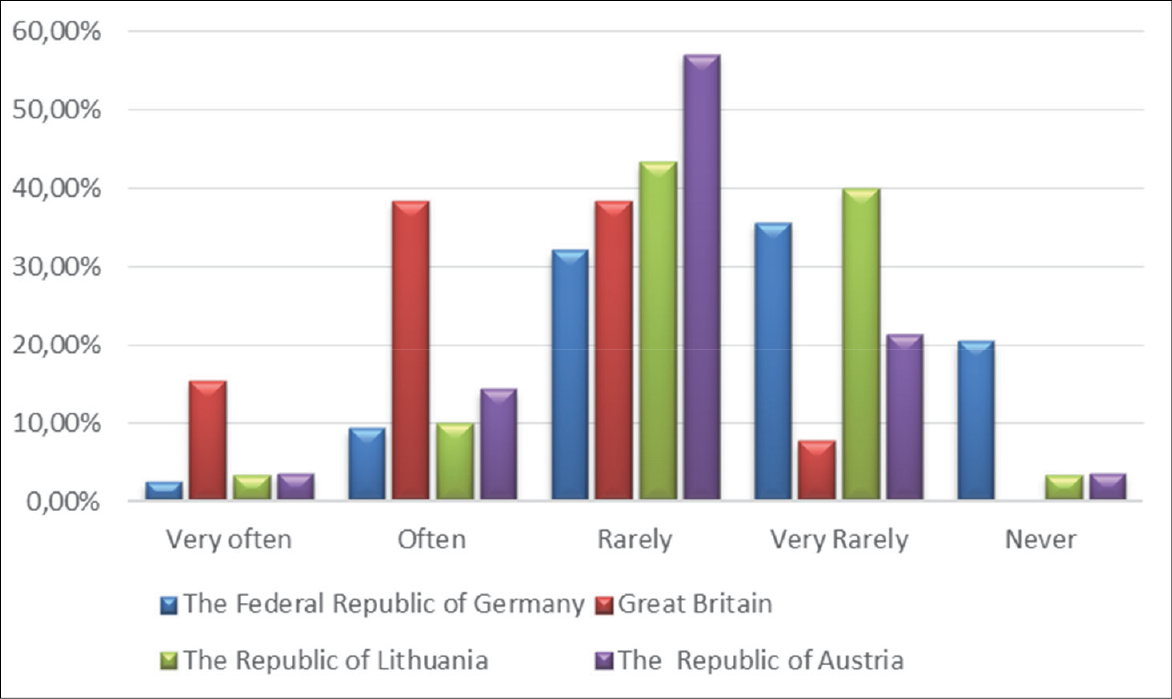
Fig. How often parties of a dispute, even though they have not received information about mediation, themselves request that the dispute be resolved through mediation, in four countries (percent)
Speaking about the role of a lawyer before mediation, lawyer G. Černiauskas noted that when you start communicating with a client, mediation is not even discussed, because the client not only does not know what mediation is, he/she has never heard of it and does not understand it, and often even confuses mediation with meditation (Černiauskas, 2020). Therefore, the lawyer has a very important role in advising the client not only by offering mediation as a way to settle the dispute, but also by educating the client on this issue. This is also confirmed by the research conducted by the author, because when evaluating the results of the research between individual states, it can be seen that the main reason for not applying mediation in the activities of lawyers is the same in all four countries, i.e., there are no clients willing to mediate the dispute. When resolving disputes with the help of mediation, not only lawyers, but also parties to the dispute must know what mediation is, understand its benefits and the principles of its application. Only then is it possible to effectively start talking with the client about one of the alternative ways to resolve the dispute amicably.
The concept of mediation in the context of a lawyer’s activity also manifests itself in the fact that lawyers participating in mediation, regardless of the chosen role, must not focus on the strict application of legal norms, but on a process based on the search for compromises. In addition, according to G. Imfeld (Imfeld, 2020), lawyers conducting mediation should not try to satisfy the interests of each of the disputing parties to the maximum, thereby demonstrating loyalty to the latter. It is much more important for lawyers-mediators to focus on objectivity, neutrality and impartiality (Henssler, 1997, p. 129), which they must ensure with respect to each party to the dispute without reservation. It is important to realize that mediation in the activities of lawyers is not a traditional dispute resolution based on competition, it is rather a cooperation, an effort to understand the real interests of all parties to the dispute and help them in finding a peaceful solution (Kaminskienė et al., 2019, p. 53).
Conclusions
1. The interaction between mediation and the activities of a lawyer benefits both parties: 1) by having legal knowledge, lawyers can contribute to the development of mediation and the improvement of the quality of mediation through their activities in the field of mediation; 2) mediation, with the participation of lawyers, advising clients on mediation, including a mediation clause in drafting contracts and/or disseminating information about mediation to the public, can have a positive effect on lawyers’ qualifications and notoriety, thus allowing lawyers to remain competitive in the dispute resolution market.
2. Lawyers’ attitudes towards mediation, as well as their personal characteristics, qualifications, the will of the clients and the nature of the dispute, are decisive for lawyers in deciding whether to use mediation in their activities.
3. In order for a lawyer to reach an appropriate decision on the suitability of a dispute for mediation, he or she must have sufficient knowledge and skills in the field of mediation and be able to compare the possible outcomes of the dispute both in court and in mediation. A lawyer must have a good understanding of both the litigation process and mediation and other ADRs, their interactions, similarities and differences.
4. The influence of lawyers on the development of mediation is one of the greatest, as it is the lawyers who are the first to be consulted by the parties to a dispute in the event of a dispute. Lawyers also have a high profile in society because of their professional qualifications in the field of law. Therefore, in order to develop effective mediation, it is very important to: 1) form a positive attitude of lawyers towards mediation; 2) ensure that lawyers have sufficient knowledge and experience in the field of mediation; 3) involve lawyers in mediation activities.
5. Lawyers are in many cases positive about mediation and can apply it in various areas of legal relations. Nevertheless, lawyers still relatively often see disputes as unsuitable for mediation, the interest of lawyers in mediation is low, and the application of mediation in the activities of lawyers, especially in Lithuania, is rare.
6. A number of lawyers still consider that the activities of a lawyer and a mediator are only partially compatible. Nevertheless, lawyers are convinced that they are best placed to act as mediators compared to other professions. This is due to the fact that lawyers have the legal knowledge needed, for example, in drafting a settlement, assessing the balance of power between the parties, providing general legal advice (if the parties wish so), and so on.
7. Lawyers are the most suitable for the role of mediator, compared to representatives of other professions, because: (1) lawyers have the legal knowledge needed, for example, in drafting a settlement agreement, assessing the (dis)balance of the parties’ forces, providing general legal advice (if the parties desired), (2) finding a way out, when the parties to the dispute reach an impasse, based on the legal basis and/or previous experience gained in resolving disputes, (3) preventing the parties to the dispute from getting too ‘distanced’ from reality, because any agreement that the parties to the dispute want to conclude and confirm in court, must comply with mandatory legal norms and not contradict the public order.
Bibliography
Special literature
Breidenbach, S. (1997). Mediation – Komplementäre Konfliktbehandlung durch Vermittlung. DocPlayer. Europa-Universität Viadrina, Frankfurt / Oder [online]. Available at: https://docplayer.org/17325338-Prof-dr-stephan-breidenbach-mediation-interessenbasierte-konfliktbewaeltigung-interview-mit-prof-dr-stephan-breidenbach-am-2.html [Accesed 18 October 2020].
Černiauskas, G. (2020). Mediacija advokato akimis. Pranešimas konferencijoje Privalomoji mediacija – iššūkiai ir galimybės, Vilnius, 2020 m. vasario 6 d. [online]. Available at: https://www.youtube.com/watch?v=igzpP_5DLM8 [Accesed 19 May 2021].
Cominelli, L. (2016). Training Young Lawyers in the European Mediation Framework: It’s Time to Devise a New Pedagogy for Conflict Management and Dispute Resolution, The Italian Law Journal. ItaLJ, 174–175 [online]. Available at: https://www.academia.edu/27133616/Luigi_Cominelli [Accesed 29 July 2020].
Hehn, M., Alsdorf, S. (2008). Mediation – Professionelles Konfliktmanagement. Reemers Publishing Services GmbH, Krefeld [online]. Available at: https://anwaltverein.de/files/anwaltverein.de/downloads/praxis/spezialisierung/Mediation.pdf [Accesed 21 July 2020].
Hellwig, H.-J. (2009). Das Konzept des anwaltlichen Berufsbildes: Worauf die Anwaltschaft eine Antwort finden muss – und warum Standesrichtlinien nicht helfen. Studentische Zeitschrift für Rechtswissenschaft Heidelberg, 1/2009 [online]. Available at: https://www.hjr-verlag.de/out/pictures/wysiwigpro/Das%20Konzept%20des%20anwaltlichen%20Berufsbildes.pdf [Accesed 21 September 2021].
Henssler, M. (1997). Anwaltliches Berufsrecht und Mediation. Anwaltsbaltt. viewed [online]. Available at: http://www.anwaltsrecht.uni-koeln.de/fileadmin/sites/anwaltsrecht/Aufsaetze/Henssler__AnwBl._03-1997__129ff.pdf [Accesed 4 February 2020].
Horn, C.-H. (1993). Einführung in die Mediation, 2, quoted from Mähler, Mediation in Familiensachen (Protokoll 30/93 der Evangelischen Akademie Bad Boll).
Imfeld, G. (2020). Alternative Streitschlichtung und Kooperative Praxis. 2020-4, 92-94. [online]. Available at: https://www.rak-koeln.de/content/download/3672/51871/version/1/file/KF%202020_4.pdf [Accesed 22 June 2020].
Kaminskienė, N. et al. (2016). Lietuvos advokatų požiūrio į taikų ginčų sprendimą ir mediaciją tyrimas. Socialinių mokslų studijos 8, 1(2016):53 [online]. Available at: https://www.mruni.eu/upload/iblock/aa1/N8-1-03_%C4%8Ciuladiene.pdf [Accesed 21 February 2020].
Kaminskienė, N. et al. (2019). Mediatoriaus vadovas. Vilnius: Mykolo Romerio universitetas.
Kardelis, K. (2002). Mokslinių tyrimų metodologija ir metodai. Kaunas [online]. Available at: https://verslas09.files.wordpress.com/2010/01/mtp.pdf [Accesed 2 January 2020].
Konnertz, E.-M. (2014). Rechtsanwälte als Wegbereiter und Wegbegleiter in der angewandten Mediation, 34. (Hamburg: Verlag Dr. Kovač, 2014).
Levien, D.-A. (2019). Neue Chancen für Juristen. E-Zeitschrift Legal Revolutionary [online]. Available at: https://www.diruj.de/alternative-streitschlichtung/ [Accesed 31 January 2021].
Rüstow, A. (2008). Außergerichtliche Mediation im (regulierten) Abseits? Zeitschrift für Rechtsentwicklung und Rechtsprechung in den Neuen Ländern, 9, 385–432.
Ruževičius, J. (2016). Magistrantūros studijos: baigiamojo darbo projektų (BDP) ir magistro darbo (MD) rašymas. Vilnius, 2016, 19, quoted from Astos Valackienės, Sociologinis tyrimas (Kauno technologijos universitetas, 2007).
Simaitis, R. (2020). Privalomosios mediacijos iššūkių įveika lyginamaisiais aspektais. (Presentation at the conference „Mandatory mediation – challenges and opportunities“. Vilnius, 2020 February 6) [online]. Available at: https://www.youtube.com/watch?v=igzpP_5DLM8 [Accesed 19 May 2020].
Štaraitė-Barsulienė, G. (2018). Mediacijos notaro veikloje taikymo galimybės ir teisinio reguliavimo Lietuvoje tobulinimo kryptys (doctoral dissertation, Vilnius, 2018) [online]. Available at: https://vb.mruni.eu/object/elaba:27451071/27451071.pdf [Accesed 19 July 2020].
Trenczek, Th. et al. (2017). Mediation und Konfliktmanagement, Baden-Baden: Nomos Verlagsgesellschaft.
Trossen, A. et al. (2014). MEDIATION (un)geregelt. Die Konsolidierung von Mediation, Psychologie und Recht. Der universelle Praxis B und Lehrbuchkommentar zur alternativen Konfliktbeilegung (Altenkirchen: WinKManagement GmbH).
Valente, C. (2014). Mediation. An overview of the functionality of Alternative Dispute Resolution in the English legal system. Roma [online]. Available at: https://iris.unipa.it/retrieve/handle/10447/101666/246226/Final_Research_Report_Mediation_in_Europe.pdf [Accesed 14 February 2021].
Vėgėlė, I. (2020). Kiek advokatų reikia Lietuvai? Infolex [online]. Available at: https://www.infolex.lt/portal/start.asp?act=news&Tema=1&Str=58648# [Accesed 24 June 2020].
Von Hertel, A., Vovsik, W., Fischer A. R., Wiese, J. (2020). Zeittafel zur Geschichte der Mediation, 1 [online]. Available at: https://mediation-dach.com/fileadmin/pdf/historisches.pdf [Accesed 4 February 2020].
Wambach-Schulz, M. K. (2018). Im Spannungsfeld anwaltlicher Mediation. Dissertation, Rheinisch-Westfälische Technische Hochschule Aachen.
EU Legislation and Court
Alternative Dispute Resolution and the Judicial Domain. ENCJ report on ADR and the Judicial Domain. (GA Paris, 9 June 2017), 9, 23–35 [online]. Available at: https://www.km-kongress.de/html/download.cms?id=36https://www.encj.eu/images/stories/pdf/workinggroups/encj_report_adr_2016_2017_adopted_ga_paris.pdf [Accesed 29 July 2020].
Analysis on assessment of the impact of Council of Europe recommendations concerning mediation. Working group on mediation (CEPEJ-GT-MED) [online]. Available at: https://rm.coe.int/1680747c1f [Accesed 6 Januar 2023].
Guidelines for a better implementation of the existing recommendation concerning family mediation and mediation in civil matters. European Commission for the Efficiency of Justice (CEPEJ) [online]. Available at: https://rm.coe.int/16807475b6 [Accesed 7 Januar 2023].
Mediation Development Toolkit. Ensuring implementation of the CEPEJ Guidelines on mediation, CEPEJ(2018)7REV [online]. Available at: https://rm.coe.int/mediation-development-toolkit-ensuring-implementation-of-the-cepej-gui/16808c3f52 [Accesed 8 January 2023].
German RDG. Federal Office of Justice [online]. Available at: https://www.gesetze-im-internet.de/rdg/ [Accesed 14 March 2022].
Directive 2008/52/EC of the European Parliament and of the Council of 21 May 2008 on certain aspects of mediation in civil and commercial matters. Official Journal of the European Union [online]. Available at: https://eur-lex.europa.eu/legal-content/LT/TXT/?uri=celex%3A32008L0052 [Accesed 7 January 2023].
Code of conduct for European mediators [online]. Available at: https://www.bafm-mediation.de/internationales/english-information/european-code-of-conduct-for-mediators/ [Accesed 8 January 2022].
Other
Stichprobenrechner. Qualtrics LLC [online]. Available at: https://www.qualtrics.com/de/erlebnismanagement/marktforschung/stichprobenrechner/ [Accesed 2 January 2020].
Apklausos imties dydis. Apklausos.LT [online]. Available at: http://www.apklausos.lt/imties-dydis[Accesed 2 January 2020].
Sample Size Calculator. Creative Research Systems [online]. Available at: https://www.surveysystem.com/sscalc.htm [Accesed 2 January 2020].
Statistics of German lawyers [online]. Available at: https://brak.de/w/files/04_fuer_journalisten/statistiken/2020/2020_mitgliederstatistik_ohne-partg.pdf [Accesed 24 June 2020].
Statistics of Austrian lawyers [online]. Available at: https://www.rechtsanwaelte.at/kammer/kammer-in-zahlen/mitglieder/ [Accesed 24 June 2020].
Statistics of Great Britain lawyers [online]. Available at: https://www.cross-channel-lawyers.de/in-england-2018-erstmals-mehr-anwaeltinnen-als-anwaelte/ [Accesed 24 June 2020].
Mediation in the Activities of a Lawyer
Raimonda Kraemer LL.M.
(Mykolas Romeris University)
Summary
Over time, not only the expressions of mediation have changed, but also the nature and scope of the lawyer’s activity in resolving disputes: from the traditional activity of a lawyer to additional specialization and/or activity with the help of AGS. Over time, the lawyer became increasingly perceived as a person with ‘extended’ competence.
Today, high demands are placed on lawyers not only by clients but also by the market of legal services. Therefore, it is necessary for him to seek new competences that would help to optimally examine each legal dispute and thus remain in a competitive environment. In recent years, mediation has gained more and more importance, but its application in lawyers practice is still insufficient.
The results of the study showed that, although lawyers use mediation in their activities, they do it too rarely. Lawyers still have to improve when applying mediation, because only a quarter of the respondents rated the lawyers themselves as ‘very good’ in mediation.
Among the respondents, ‘very good’ or ‘good’ knowledge about mediation dominates. In addition, this study showed that lawyers with mediator qualifications rate their knowledge of mediation better. Among all the respondents who took part in the survey, the least number of those who obtained the qualification of a mediator were in Lithuania. Lithuanian lawyers also rated their knowledge in the field of mediation the worst.
Given that less than half of the respondents (48.97%) rated their ability to explain mediation to clients as ‘very good’ and almost a quarter of respondents (23.97%) stated that they do not use mediation in their activities, because there are no customers who want to resolve the dispute in mediation – it is assumed that with the small number of clients willing to resolve the dispute in mediation, perhaps the lawyers themselves contribute in part. This conclusion is based on the fact that some clients may not receive comprehensive information about mediation from their lawyers, some of which fail to adequately explain to their clients what mediation is.
In addition, the majority of interviewed lawyers quite often see cases of dispute as unsuitable for mediation, even though it has been scientifically researched that basically all conflicts can be mediated. Therefore, it is reasonable to ask whether lawyers do not lack knowledge when deciding on the suitability of disputed cases for mediation.
Mediacijos taikymas advokato veikloje
Raimonda Kraemer LL.M.
(Mykolo Romerio universitetas)
Santrauka
Šio tyrimo objektas – Lietuvos, Didžiosios Britanijos, Vokietijos ir Austrijos advokatų požiūris į mediaciją. Tyrimui atlikti buvo naudojami: mokslinės literatūros analizės, dokumentų analizės, t. y. teisinio reglamentavimo vertinimo ir lyginimo, sintezės, apklausos bei kiekybinio tyrimo rezultatų analizės metodai.
Tyrimo tikslas ir uždaviniai: atlikus Lietuvos, Didžiosios Britanijos, Vokietijos bei Austrijos advokatų apklausą (apklausa vykdyta 2020 m. vasario 14 d. – 2020 m. gegužės 31 d.) dėl mediacijos taikymo jų veikloje ir remiantis jos metu gautais duomenimis atskleisti: ar advokatai taiko mediaciją savo veikloje, kaip dažnai; kaip advokatai vertina savo veiklą mediacijoje, kokios to priežastys. Atskleisti, ar advokatams pakanka žinių apie mediaciją, kokią tam turi įtaką mediatoriaus kvalifikacija; kaip advokatai vertina mediaciją, koks jų požiūris į šį AGS būdą; ar ir kiek advokatai geba suteikti klientams informacijos apie mediaciją ir kokia advokatų nuomonė apie tinkamiausią profesiją mediatoriaus vaidmeniui.
Tyrimas atskleidė, kad nors daugiau nei 90 proc. advokatų savo veikloje taiko mediaciją, vis dėlto net 25 proc. respondentų ją taiko tik kartais ir vos 3 proc. – dažnai. Tai reiškia, kad advokatai per retai taiko savo veikloje mediaciją. Ypač tai pasakytina apie Lietuvos ir Vokietijos advokatus. Advokatams apsisprendžiant dėl mediacijos taikymo savo veikloje lemiamą reikšmę turi jų požiūris į mediaciją, taip pat asmeninės savybės, kvalifikacija, klientų valia ir kilusio ginčo pobūdis.
Tyrimas parodė, kad mediaciją taikyti advokatų veikloje labiausiai skatina geresnis klientų lūkesčių patenkinimas mediacija ir mažau patiriama neigiamų emocijų bei psichologinės įtampos mediacijoje. Pagrindinės priežastys, dėl kurių advokatai netaiko mediacijos savo veikloje, – klientų, kurie norėtų ginčą spręsti mediacija, trūkumas ir advokatų supratimas, kad ir be mediacijos galima sėkmingai sutaikyti ginčo šalis.
Dauguma respondentų (54,70 proc., N = 157) mediaciją savo veikloje vertina „gerai“, o tik 26,13 proc. (N = 75) – „labai gerai“. Kitų atsakymai „patenkinamai“ (14,29 proc., N = 41) ir „nepatenkinamai“ (4,88 proc., N = 14). Šie skaičiai rodo, kad advokatams dar yra kur tobulėti, nes savo veiklą mediacijoje „labai gerai“ vertina tik ketvirtadalis atsakiusiųjų.
Tyrimas parodė, kad daugiausia advokatai mediaciją vertina teigiamai ir gali taikyti ją įvairiose teisinių santykių srityse. Nepaisant to, advokatų domėjimasis mediacija dar labai mažas, o šis tarpininkavimo būdas advokatų veikloje, ypač Lietuvoje, – taikomas retai. Kita vertus, matyti, kad Lietuvos advokatų, kurie dalyvauja mediacijoje kaip mediatoriai, skaičius per paskutinius penkerius metus išaugo.
Daugelis advokatų (37,47 proc.) mediaciją savo veikloje taiko geresniam klientų lūkesčiui patenkinti, o penktadalis (20,08 proc.) dėl to, kad patiria mažiau neigiamų emocijų ir psichologinės įtampos. Be to, mediacija gali būti pigesnė, greitesnė, mažiau rizikinga, palyginti su teismo procesu. Vis dėlto sprendimas mediacijoje paliktas ginčo šalių atsakomybei, todėl rizika, kad ginčo šalims pasiekti taikos susitarimo nepavyks, išlieka. Manoma, kad ginčus spręsti tikslinga patikėti teisininkams profesionalams, nes tada geriau užtikrinamas priimamų taikių susitarimo sąlygų teisėtumas ir įvykdymas.
Dauguma tyrime dalyvavusių advokatų savo žinias apie mediaciją įvertino „labai gerai“ (41,92 proc.) arba „gerai“ (41,24 proc.) Nedaugelis respondentų savo šios srities žinias vertino „patenkinamai“ (15,12 proc.) ar net „menkai“ (1,03 proc.). Tik du respondentai nurodė neturį žinių apie mediaciją. Todėl galima teigti, kad tarp respondentų dominuoja „labai geros“ arba „geros“ žinios apie mediaciją. Atlikus analizę pagal valstybes, matyti, kad geriausiai savo žinias mediacijos srityje vertino Didžiosios Britanijos ir Austrijos advokatai. Vokietijoje savo žinias apie mediaciją labai gerai įvertino tik šiek tiek daugiau nei trečdalis, o Lietuvoje tik penktadalis advokatų.
Šis tyrimas taip pat atskleidė, kad turintys mediatoriaus kvalifikaciją advokatai savo žinias apie mediaciją vertina geriau. Pavyzdžiui, „labai gerai“ ir „gerai“ savo žinias apie mediaciją vertino net 100 proc. Didžiosios Britanijos respondentų. Tiek pat respondentų buvo įgiję ir mediatoriaus kvalifikaciją. Iš visų apklausoje dalyvavusių respondentų mažiausiai mediatoriaus kvalifikaciją įgijusiųjų buvo Lietuvoje. Prasčiausiai savo mediacijos srities žinias vertino taip pat Lietuvos advokatai.
Mediatoriaus kvalifikacijai turėtų būti keliami patys aukščiausi reikalavimai, tačiau daugiausia vyrauja vidutiniai ir aukšti reikalavimai. Specializuotų mediacijos mokymų advokatams taip pat trūksta. Nepaisant to, advokatai, įgiję mediatoriaus kvalifikaciją, turi daugiau žinių apie mediaciją, palyginti su tais, kurie mediatoriaus kvalifikacijos neturi, taip pat geba geriau paaiškinti klientams, kas yra mediacija. Todėl skatintina advokatams įgyti mediatoriaus kvalifikaciją.
Daug advokatų visose valstybėse nurodė galintys klientams suteikti informacijos apie mediaciją arba „labai gerai“ (48,97 proc.) arba „gerai“ (41,38 proc.). Nedaugelis respondentų vertino šį gebėjimą „patenkinamai“ (7,93 proc.) arba „menkai“ (0,69 proc.). Neturinčių šio gebėjimo buvo tik 1,03 proc. respondentų. Todėl galima teigti, kad dauguma advokatų „gerai“ ir net „labai gerai“ geba paaiškinti klientams, kas yra mediacija.
Advokatų įtaka mediacijos plėtrai yra viena iš didžiausių, nes būtent advokatai yra tie specialistai, į kuriuos ginčo šalys, kilus ginčui, patarimo dėl jo sprendimo kreipiasi pirmiausia. Advokatai dėl savo profesinės kvalifikacijos teisės srityje taip pat turi didelį autoritetą visuomenėje. Veiksmingai mediacijos plėtrai labai svarbu: 1) formuoti teigiamą advokatų požiūrį į mediaciją; 2) užtikrinti, kad advokatai turėtų pakankamai žinių ir patirties mediacijos srityje; 3) įtraukti advokatus į mediacijos veiklą.
|
Raimonda Kraemer LL.M. has a university degree and many years of experience in education, law and mediation. The underlying aim of her doctoral thesis was to research and evaluate the application of mediation in the legal practice of lawyers. Raimonda Kraemer LL.M. turi universitetinį išsilavinimą ir ilgametę patirtį švietimo, teisės ir mediacijos srityse. Pagrindinis jos daktaro darbo tikslas buvo ištirti ir įvertinti mediacijos taikymą advokatų profesinėje veikloje. |